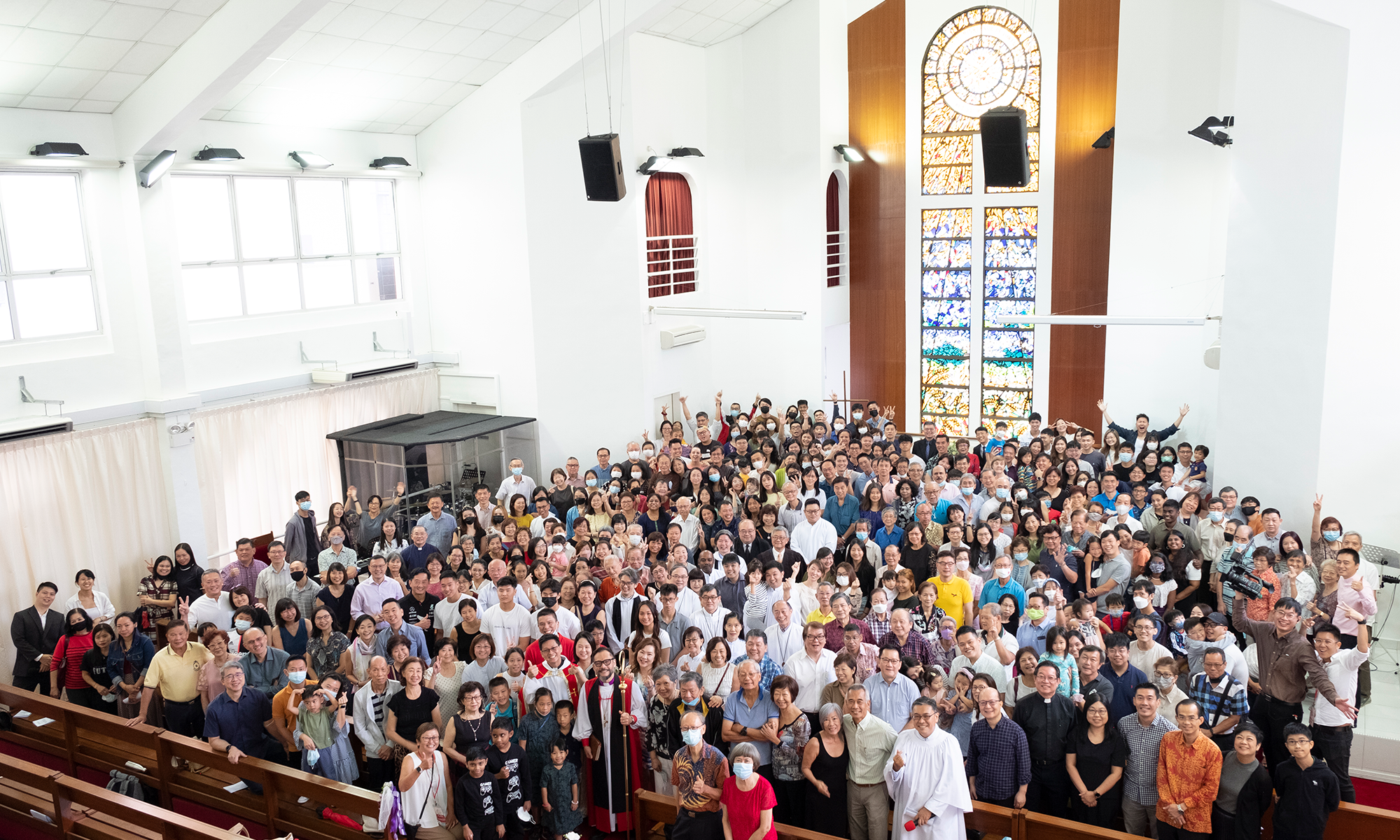The Trinity – God the Father, God the Son and God the Holy Spirit
The Bible teaches that there is ONE God, and there are THREE persons – Father, Son, and the Holy Spirit (the Holy Trinity). The Bible affirms that each of these three persons has divine attributes, titles, and actions and accords to them the worship that is due to Deity.
God is personal. We must get to know Him as we get to know a person. God is love. This is supremely seen in the death of Jesus Christ on the cross for the sins of humankind (John 3:16). God is holy, infinite, eternal, unchanging (immutable) and is the Creator of all things, both material and spiritual, and the source of life. He is omnipotent (all-powerful), omnipresent (present everywhere) and omniscient (all-knowing).
Jesus Christ is both real God and real Man. He has all the attributes and actions of Deity. He was born into this world as a human baby and grew up like any child. He had normal physical limitations and experienced human emotions. He died and was buried, but rose again, ascended into heaven and is alive forever. By His death on the cross, Jesus Christ achieved the salvation of sinners, the revelation of God and the conquest of evil. John the Baptist introduced Jesus as the Lamb of God who takes away the sins of the world (John 1:29), as well as the baptizer in the Holy Spirit (Luke 3:16).
The Holy Spirit is a Person. He is God, together with the Father and the Son. He has all the attributes and actions of Deity. He is the author, teacher, and interpreter of Scripture. He convicts people of sin, righteousness, and judgement. In relation to believers, He fills, guides, empowers, teaches, intercedes, speaks, commands, and gives gifts. Christians are to bear the fruit of the Holy Spirit (Galatians 5:22-23).
Salvation
Man was created in the image of God (Genesis 1:26-27). He has a spirit, soul (mind and emotions) and body. Adam and Eve sinned, and through them sin entered humanity (Genesis 3). All have sinned and fallen short of God’s standard (Romans 3:23). Man is incapable of redeeming himself. The Bible teaches that the wages of sin is death (Romans 6:23).
To overcome this dilemma, God sent His Son Jesus Christ to die for the sins of humankind (John 3:16). Through His perfect sacrifice on the cross (Hebrews 10:14), He paid the penalty of sin (Mark 10:45), and we now have access to God through Jesus Christ (Ephesians 2:18; Hebrews 10:19). Jesus is the only way to God (John 14:6).
To enter the Kingdom of God, one must be born again by the Holy Spirit (John 3:3-8), by repenting of our sins (Luke 5:32) and receiving Jesus into our lives as a Saviour, Lord and God (Romans 10:9; 1 Timothy 4:10). We are to live our new life in Christ (2 Corinthians 5:17), in faith and obedience (Romans 1:5), by offering ourselves as a living sacrifice to God (Romans 12:1) and be more than conquerors (Romans 8:37).
The Bible
The Bible is God’s love letter to His people. It is inspired by God and “is useful for teaching, rebuking, correcting and training in righteousness that the man of God may be thoroughly equipped for every good work (2 Timothy 3:15-17). The Bible is the final authority in all matters of faith and conduct.
The word “Bible” comes from the Greek word “biblios” which means book. It contains 66 books, written by 40 authors over a period of about 1600 years. It consists of the Old Testament (39 books) and the New Testament (27 books). The word “testament” means covenant or agreement. The Old Testament is the agreement God made with man about his salvation. The New Testament reveals Jesus Christ as the promised Saviour of the world. The primary purpose of the Bible is to unfold God’s plan of salvation through Jesus Christ. Scripture bears witness to Christ so that we might respond to Him in faith (Romans 10:17).
The Ten commandments is God’s blueprint of how you are to live and to relate both to God and men (Exodus 20:1-20; Deuteronomy 5:5-21). They are as follows:
1. I am the Lord your God: you shall have no other gods but Me.
2. You shall not make for yourself any idol.
3. You shall not dishonour the name of the Lord your God.
4. Remember the Lord’s Day and keep it holy.
5. Honour your father and mother.
6. You shall not commit murder.
7. You shall not commit adultery.
8. You shall not steal.
9. You shall not be a false witness.
10. You shall not covet anything which belongs to your neighbour.
Jesus summarized the Ten Commandments into two: “Love the Lord your God with all your heart and with all your soul and mind. This is the first and greatest commandment. The second is like it: Love your neighbour as yourself.” (Matthew 22:37; Mark 12:30-31)
The Church
In the New Testament, the Church means an assembly of believers. It means the called-out ones. The Church is the body of Christ. Christ is the head of the body (Ephesians 5:23; Colossians 1:18). He is the source of life and has authority over the body. Like different parts of the body, there is diversity within unity in the Church (1 Corinthians 12:27). The term “church” is used in two ways: universally to refer to all believers in Christ, and locally to refer to an assembly of believers.
The mission of the Church includes the following aspects of life:
1. Worship
The primary function of the Church is to love God and to glorify Him. Worship is to be carried over as an attitude to the whole of life. Thus, God is to be worshipped not only through our praise and prayer, but our giving, our serving, our witnessing, and our loving.
2. Fellowship
The Church is to provide fellowship for believers. This is the common participation in the life of God. It expresses itself in unconditional love or agape, and in hospitality. Throughout Christian fellowship, believers learn how to forgive one another (Ephesians 4:32), to bear one another’s burden (Acts 11:29), to pray for one another (James 5:16), and even to admonish one another (Hebrews 10:24; Colossians 3:16).
3. Ministry
The Church is called to serve. The supreme example of ministry or humble service is found in Jesus Christ (Mark 10:45).
4. Witness
The Church is called to witness. The call to witness lay at the heart of Jesus’ final instructions to the apostles to evangelize the world (Matthew 28:18-20; Mark 16:15; Acts 1:8). The responsibility to make disciples of all nations should not rest on a few individuals in the Church but on the Church corporately.
There are two sacraments in the Church – water baptism and holy communion. Remember that a sacrament is an outward and visible sign of an inward and spiritual grace.
- Water Baptism
Water baptism is part of the Great Commission: “Go therefore and make disciples of all nations, baptising them in the name of the Father, and of the Son and of the Holy Spirit…” (Matthew 28:18-20) It is the first step of obedience to Jesus Christ (Acts 2:38). - Holy Communion
Holy Communion or the Lord’s Supper commemorates the death of the Lord Jesus on the cross. Twice at the Last Supper, Jesus said, “Do this in remembrance of me.” The Apostle Paul says that every time we take part in the Holy Communion service, we “proclaim the Lord’s death until He comes” (1 Corinthians 11:24-26). We not only remember His death in the past, but we look forward to His return in the future.
The Second Coming of Christ
One of the events that every Christian can look forward to is the second coming of Christ. The New Testament repeatedly announces that Jesus Christ will one day be back. Christ will return to this world in glory.
The second coming will be sudden, personal and physical, visible and triumphant (Matthew 24:44; 2 Thessalonians 1:10; Revelation 1:7). It will result in the end of human history, resurrection of the dead and the final judgement of the world (John 5:28-29). It will give God’s children their final glory and bring in new heavens and a new earth.
No one knows the timing of the second coming. The Bible, however, tells us that a number of predictions must be fulfilled before Christ returns:
1. Natural disasters – earthquakes, famines, pestilence, fearful events, signs from heaven (Luke 21:11, 25).
2. Social evils – lovers of money, boastful, proud, abusive, disobedient to their parents, ungrateful, unholy, without love (2 Timothy 3:1-5).
3. International wars – kingdoms rising against kingdoms (Mark 13:7-8; Luke 21:9-10).
4. Persecutions, betrayals, and spiritual deception (Matthew 24:4-14; Mark 13:12; Luke 21:26).
Christians are to live in readiness at all times for the second coming of Christ.

